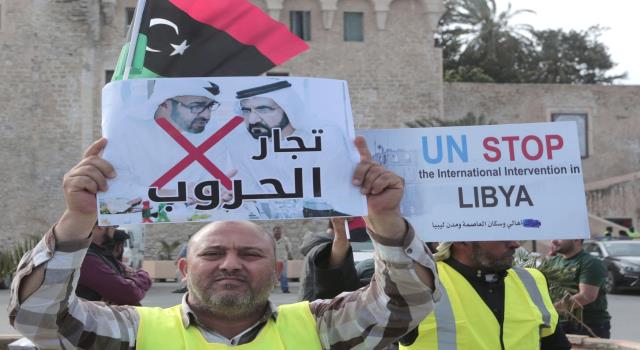DW revealed details about European pressure on the UAE to withdraw its mercenaries from Libya to enable the transitional government’s prospect of success to save the country.
The Deutsche Welle (DW) said that grave security challenges face the new transitional government in Libya, most notably the presence of militias from outside parties, foremost is the UAE.
The site stated that securing energy sources and the sprawling Libyan coastline is at the core of European support for the Libyan government.
This was stated by the President of the European Council, Charles Michel, during his recent visit to Tripoli, speaking about the immigration issues that plague the neighbouring northern countries.
Last December, the United Nations put an estimate of twenty thousand foreign and mercenary forces in Libya.
In parallel, the ongoing complex US and European dialogue with the Russians about withdrawing the Wagner mercenaries from eastern Libya.
Through the IRENI mechanism to monitor Libya’s arms embargo, the Europeans began their pressure on the Emirates and Egypt to expel African and Arab mercenaries from the Libyan lands.
Suppose the Libyan national unity government and its international backers overcome the obstacle of mercenaries and foreign forces, Libya will face another, more complex dilemma: restructure the security forces and build a unified national army.
Achieving it requires the dismantling of the militias in the West of the country and the forces of General Khalifa Haftar in the east, which Abu Dhabi supports.
It is unlikely that this task will be accomplished soon, at least under the transitional government, due to the ongoing Emirati incitement.
Since assuming the presidency of the transitional government in Libya, Abd al-Hamid al-Dabaiba and his government team have been working hard in the direction of laying the foundations of a new scene in his country to remove it from the tunnel of the civil war and the political crisis that has ravaged it for a decade.
Many observers were surprised by Dabaiba to head the government at the end of the Geneva talks that took place at the beginning of last February under the United Nations’ auspices and how he surpassed the leaders of the Libyan scene.
Today, he is moving rapidly to change many scales in the terrain of the situation in Libya, in a way that may surprise the observers, and put his country on the way out from the tunnel of the crisis, so will it achieve a miracle and the Libyan phoenix resurrected?
New features in the Libyan scene
Abdul Hamid al-Dabaiba, who grew up in the city of Misurata and studied planning and construction engineering in Canada and then the United States, came to the Libyan scene from the world of finance and business, relying on the influence of his city, Misrata, in the Libyan scene after the revolution that toppled the regime of the late Colonel Omar Gaddafi.
Dabaiba grabbed the premiership from the quarrelsome “mouths of the lions” in the Libyan scene, including the two sons of his city, the strong man in the West, the former Interior Minister Fathi Bashagha and Ahmed Maitiq, who manoeuvred in the last moments with the strongman of the East, General Khalifa Haftar, and was able to remove the veteran Aqila Saleh Speaker of the House of Representatives (East).
Dabaiba’s rise signalled General Haftar’s camp retreat supported by the UAE, Egypt, and Russia.
However, observers are cautiously looking at the reality of the two parties’ noticeable setbacks.
General Haftar, who declared his support for the country’s political and peace process, avoids talking about its outcomes about his future, while his inner camp in Benghazi is witnessing mysterious liquidations, which killed his military assistant, Mahmoud Al-Werfalli, who the International Criminal Court wants.
Immediately after assuming the government’s presidency, Dabaiba drew the attention of the Libyans by touring the Libyan cities, in the West, east and south, in the role of the firefighter for the fire of regional discord and the regional wars that ravaged the country for years.
It continues its firefighting role by announcing the establishment of the High Commission for National Reconciliation recently.
He also placed Dabaiba at the top of his government’s plan to confront the Coronavirus crisis, ravaging the war-thickened Libyan body.
And his government took the initiative to acquire the first batch of vaccines that were long-awaited for Libyans.
The features of the new Libyan scene are also expressed by prominent faces in the formation of the Dabaiba government, through the remarkable presence of women in four strategic and sensitive ministries, justice, social affairs, culture and knowledge development, in addition to the Ministry of Foreign Affairs that a woman took over for the first time in the country’s history, Dr Naglaa Muhammad Al-Manqoush.
Whoever follows the developments of Libya’s situation monitors the remarkable dynamism in Tripoli’s relations with world capitals.
Since the new government’s formation, hardly a day goes by without Tripoli receiving high-level delegations among heads of state and government and foreign ministers. The most recent visitor to Tripoli is the Prime Minister of Italy, the northern neighbour, influential in Libyan affairs.
Among the most critical diplomatic gains achieved by the Dabaiba government and its Minister of Foreign Affairs, Al-Manqous, is the return of the major European countries influencing the Libyan affairs: Italy, France, Germany and Britain, in addition to the European Union, to open their embassies that were closed six years ago due to security risks.



